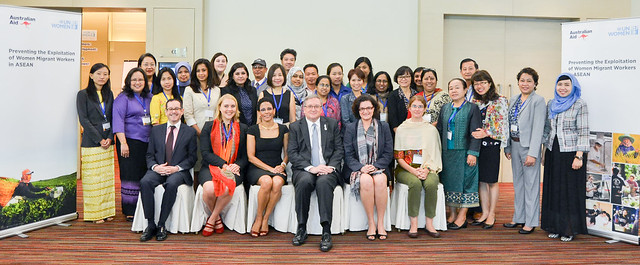Asian governments and civil society discuss gender dimensions of migration
Date:
Bangkok, Thailand – Governments, civil society organizations, ASEAN representatives and UN Women staff from Bangladesh, Cambodia, Indonesia, Lao PDR, Myanmar, Nepal, Philippines, Thailand and Viet Nam met in Bangkok to participate in the workshop ‘’Gender, Migration and Development: A Matter of Rights’’.

The training, organized by UN Women Regional Office for Asia and the Pacific in collaboration with UN Women’s Training Center, provoked thinking and action around gender inequalities present in the entire cycle of labour migration within the globalized world. It focused on migration and development from a gender and rights-based perspective.
“Migrant women are often the lifelines of their families and communities and active participants in the development of countries of destination — by way of their skills, labour, consumption and taxes and countries of origin — by way of financial and social remittances.” Said UN Women Regional Director for Asia-Pacific Roberta Clarke on her opening remarks.
The workshop, supported by the Department of Foreign Affairs and Trade of the Australian Government, is the first of its kind focusing in Gender and Migration in the Asian context. The training materials are now being converted into Asia-specific training modules by incorporating new trends and knowledge around Gender and Migration in the region.
For more information please contact:
Ruchika Bahl
UN Women Regional Programme Manager- Migration
E-mail: [ Click to reveal ]
About UN Women & Migration Programme
UN Women Asia Pacific Regional Migration Programme works to enhance the capacities of multiple stakeholders such as state agencies, ASEAN governance mechanisms, civil society organizations and local community groups to be able to undertake policy advocacy to prevent exploitation of migrant women groups, to have access to knowledge, latest trends, evidence and information to be able to ensure safety of women migrant workers at all stages of the migration cycle, and to develop skills and strategies in mobilizing national, regional and international redress mechanisms for ensuring accountability of protection of migrant women workers.
